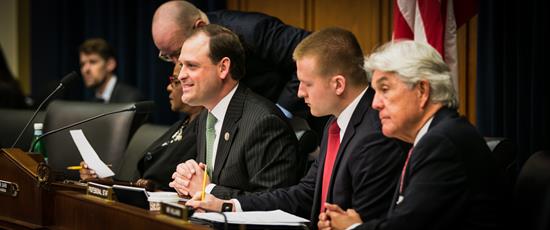The Future of Digital CurrencyThe Future of Digital Currency
Washington,
July 18, 2018
The Monetary Policy and Trade Subcommittee met today to examine the extent to which the United States government should consider cryptocurrencies as money, and their potential effect on domestic and foreign economies. The Subcommittee also evaluated the merits of any uses by central banks of cryptocurrencies to better understand the future of both digital currencies and physical cash. “Today, the subcommittee examined the potential impact of digital currency on the future of our financial system. From its viability as an alternative, to traditional currencies, to its potential adoption by central banks, to its possible impact on monetary policy, it is important Congress carefully study every aspect of this new technology.” said Subcommittee Chairman Andy Barr (R-KY). Key Takeaways
Topline Quotes from Witnesses “The convenience of electronic transfers has led to a decline in the use of cash relative to commercial bank deposits in many countries around the world… It seems likely that the use of cash for transactions will continue to fall and it is worth noting that there is tipping point at which even if customers seek to use cash, businesses and banks will not want to deal with it… I believe that the Federal Reserve will, at some point in the future, need to respond to the disappearance of cash and I have given some reasons why it might consider offering some form of retail-oriented central bank cryptocurrency. There are, however, many issues related to the viability and security of this technology that need to be fully resolved before adoption. Moreover, a much deeper understanding of the monetary policy and financial stability issues is needed.” – Dr. Rodney J. Garratt, Maxwell C. and Mary Pellish Chair, Professor of Economics, University of California Santa Barbara “Even Bitcoin remains far from being a generally accepted medium of exchange, but all cryptocurrencies can—and many do—function as a money substitute…. It is certainly difficult to imagine a cryptocurrency replacing the U.S. dollar as long as the Federal Reserve acts as a moderately good steward of the national currency, but it is for this very reason that Congress should eliminate barriers that impede people from using their preferred medium of exchange..” – Dr, Norbert J. Michel, Director, Center for Data Analysis, The Heritage Foundation “There is no doubt that the digitalization of financial transactions, records, access to information, and communication will continue to increase, and that the electronic networks underlying the activity continue to grow more intense and omnipresent. But the fundamental nature of money, it seems to me, will not change… It is clear that having a fiat currency is far too precious and profitable for governments for them ever to go back to a government currency backed and convertible into actual assets, whether gold coins or otherwise… An increase of the monopoly power of central banks, which already have too much, should be avoided.” – Alex J. Pollock, Distinguished Senior Fellow, R Street Institute |


